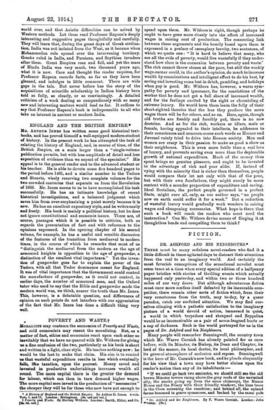POVERTY AND WASTE.l. •
NOB.ALISTS may contemn the economics of Poverty and Waste, and cold economists may resent the moralizing. But, as a matter of fact, ethics and economics react upon each other so inevitably that we have no quarrel with Mr. Withers for giving ea a fine confusion of the two, particularly as his book is short and written in a light, clear style. Ho teaches nothing new: he would be the last to make that claim. His aim is to remind us that wasteful expenditure results in loss which eventually falls, like taxation, upon the poorest. Money saved and invested in productive undertakings increases wealth all sound. The more capital there is the greater the demand for labour, which can then in turn demand higher wages. The more capital men invest in the production of " necessaries" the cheaper they will be for those who now have not enough to • A History of zue-anut and the British Empire. By Arthur D. lune& 4 vols. Vole. L and II. London Rivingtonii leo. net per voL]
t Poverty and Waste. By Hartley Withers. Loudon: Smith, Elder, and Co. Pa. iid. net.]
spend upon them. Mr. Withers is right, though perhaps he ought to have gone more closely into the effect of increased wages in raising cost of production. The connecting link between these arguments and the homily based upon them is expressed in a preface of exemplary brevity, two sentences, of which we quote one : " It is hard to believe that many, who see all the evils of poverty, would live wastefully if they under- stood how close is the connexion between poverty and waste.' The rich cannot throw stones at the poor, but still the weekly wage-earner could, in the author's opinion, do much to increase wealth by conscientious and intelligent effort to do his best, by saving and investing sums lost in drink, gambling, and holidays when pay is good. Mr. Withers has, however, a warm sym- pathy for poverty and ignorance, for the convictions of the worker that he does not get a full share of increased wealth, and for the feelings excited by the sight or chronicling of extreme luxury. He would have them learn the folly of their short-sighted theories that the less they produce the more wages there will be for others, and so on. Here, again, though old truths are freshly and forcibly put, there is no new doctrine. And as for the rich, workers or idlers, male or female, having appealed to their intellects, he addresses to their consciences and common-sense such words as Horace and Jnvenal vainly tried to drive into Roman society. Men and women are crazy in their passion to make as good a show as their neighbours. This is even more futile than a real love of luxury, and prevents saving even more than the deplorable growth of national expenditure. Much of the money thus spent brings no genuine pleasure, and ought to be invested to the advantage of rich and poor alike. If, instead of vying with the minority that is richer than themselves, people would compare their lot not only with that of the poor, but with their own forefathers, they might surely be more content with a sounder proportion of expenditure and saving. Ideal Socialism, the perfect people governed in a perfect State, might cure all, only, as our author says, " no people now on earth could suffer it for a week." But a reduction of wasteful luxury would gradually work wonders in raising wages and cheapening necessaries. What hope is there that such a book will reach the readers who most need the instruction P Can Mr. Withers devise means of flinging it at thoughtless heads and compelling them to think ?


































 Previous page
Previous page